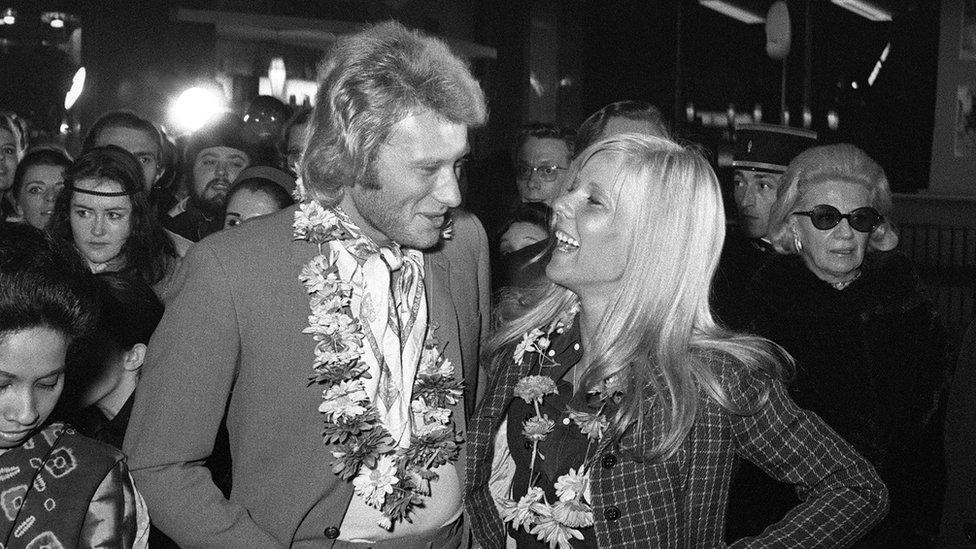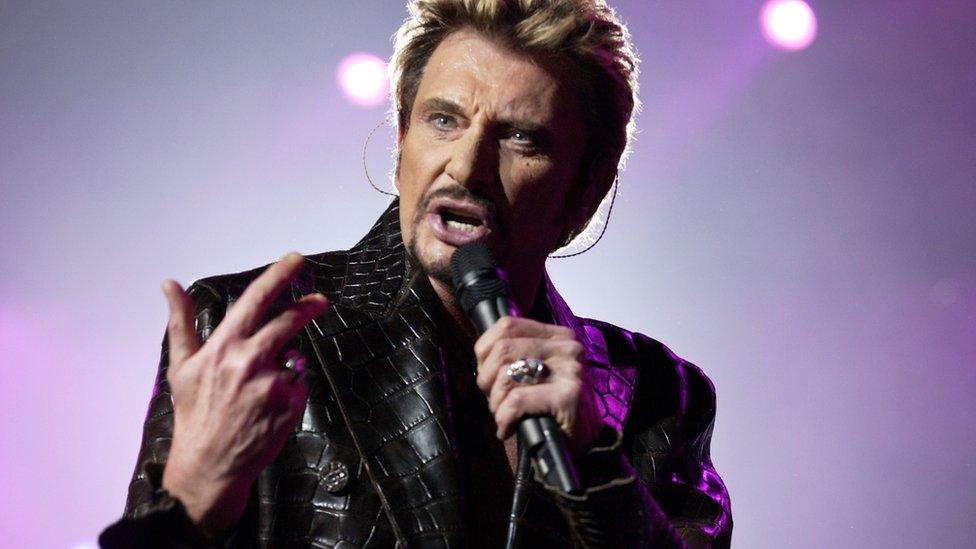Johnny Hallyday: How rocker held up a mirror to France
- Published

Hallyday embodied both an eagerness for consumerism and a thirst for values
The English-speaking world always thought Johnny Hallyday was a bit of a joke.
It is easy to see why. He shamelessly cribbed some of our best-loved songs and sang them in French, which made them sound silly. His voice could be ridiculously operatic. His brooding pose seemed a poor Gallic copy of James Dean.
He was an ersatz rocker, more showbiz than the genuine article.
All of that may be true. But it is also entirely irrelevant. Because - for all his Belgian father, his Swiss residence and his American obsession - Hallyday only really mattered in one place, and that was France.
So to mock Johnny is to mock France. But equally to understand the Hallyday phenomenon is perhaps to understand something of the modern country.
In his career and his personal life, Johnny came to embody perfectly that dual focus which is the essence of post-war France: on the one hand an eagerness for all the novelty of the consumerist, hedonist American lifestyle; on the other, a thirst for values that go beyond that, which allow France to feel it is still France.

Hallyday - seen with his then wife singer Sylvie Vartan in 1969 - made his name singing American songs
In his youth in 1950s Paris, Johnny was among the first to feel the thrill of the new sounds coming from across the Atlantic. He had a collection of rock'n'roll 45s that were the envy of his friends. So enamoured was he of all things stateside that he even told an early interviewer his father was American.
Success and its trappings arrived fast, as Johnny became the acknowledged leader of the 1960s "yé-yé" (from "yeah, yeah" in English) generation of singers. They were all at it - re-versioning classic English pop and blues songs into French - but Johnny was the best. He was the coolest, the most handsome, the one with the most convincing "rock attitude".
This was when the bond was forged with the public. The baby boomers who danced to Johnny in the 1960s went on to become France's great and good and they never let him go.
More surprisingly, successive generations also fell for the Hallyday magic, as his look changed from teddy boy to sequined strutter to goateed elder. Just this year there has been an album of covers by young artists called: In all of us there is something of Johnny.
Allow YouTube content?
This article contains content provided by Google YouTube. We ask for your permission before anything is loaded, as they may be using cookies and other technologies. You may want to read Google’s cookie policy, external and privacy policy, external before accepting. To view this content choose ‘accept and continue’.
In France there is none of the derision that in other countries accompanies the displacement of past-it performers. They cling to what they know, and as the years rolled by - from the Algeria war to the age of Instagram - they always knew Johnny would be back for a new tour, with a new album.
But mutual loyalty came from more than just the music. Because beyond the celebrity and the fun, the French public detected values in Johnny which they liked to think of as their own: hard work, stoicism in the face of adversity, simplicity, plain-speaking and a love of country.
His childhood had been a tough one. His father left home and only came back to marry Johnny's mother in order to allay gossip that he was the child of a German soldier. This was during the occupation. Later his father turned into a total wastrel, sponging off his son and dying in poverty.
"I have done some self-analysis," said Johnny in a famous interview with Le Monde in 1998. "And I can see that my early days knocked me off course. My fierce desire for a family, but my repeated failure to keep one - it all stems from that."
Hallyday went through divorces, drug-taking, motorcycle accidents, financial disasters and medical emergencies - and the French followed it all. It might have been run-of-the-mill celeb-watching except that the French - being the French - always saw it as something more significant.

There was mutual and enduring loyalty between Hallyday and the French public
Alexis Brezet, writing in Le Figaro on what feels like a day of national mourning in France, has put it best.
"His public ... was France. The France of the bad boys and girls of good families; of children and grandparents; of commies and liberals, Parisians and provincials, well-heeled bohemians and the proletariat.
"The France of bars-tabacs and cybercafés, old style dance-halls and the temples of techno.
"In the broken mirror which he held up for us, a whole nation saw its own story. In Johnny France could recognise itself - the good sides and the bad, the enthusiasms and the depressions, the falls from grace and the redemptions.
"It is this France - quarrelsome yet generous, mad yet rational, desperate and magnificent - which now hums sadly: 'In all of us there is something of Johnny.'"